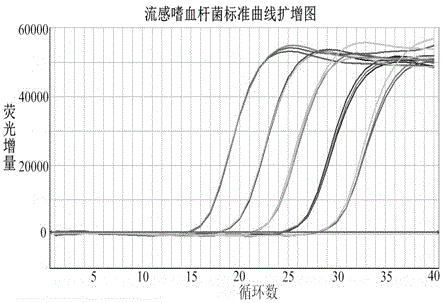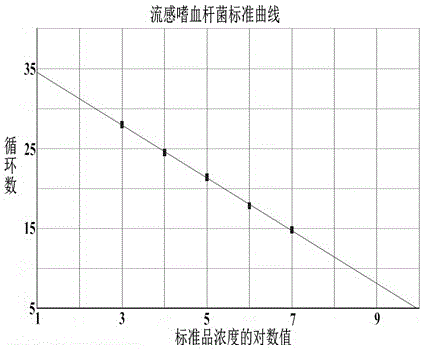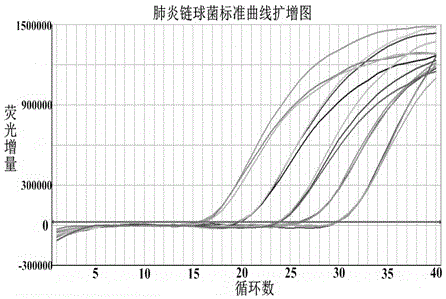Multiple quantitative PCR (polymerase chain reaction) kit for quick combined detection of four bacteria difficult to cultivate and identify
A kit and bacteria technology, which is applied in the field of multiple quantitative PCR kits for rapid joint detection of four difficult-to-culture and identify bacteria, can solve the problems of sensitivity and specificity to be improved, difficulties in separation and culture, and high technical requirements, and achieve great clinical efficacy , detection sensitivity is improved, and the effect of overuse is reduced
- Summary
- Abstract
- Description
- Claims
- Application Information
AI Technical Summary
Problems solved by technology
Method used
Image
Examples
Embodiment 1
[0068] A multiplex quantitative PCR kit for rapid joint detection of four difficult-to-cultivate and identify bacteria, consisting of DNA extract, quadruple fluorescent PCR reaction solution, 1 negative quality control, 1 strong positive quality control, and 1 weak positive quality control Products, 5 concentrations of positive quantitative standards. Among them, the quadruple fluorescent PCR reaction solution is four sets of primers, probes and qPCR reaction buffer (containing Mg 2+ ), four kinds of dNTP, HotStartTaq DNA polymerase and other components. The negative quality control product was sterile water for injection. Strong and weak positive quality control products are positive plasmid samples mixed with equal amounts of Haemophilus influenzae (HI), Streptococcus pneumoniae (SP), Moraxella catarrhalis (MC) and Legionella pneumophila (LP). Quality Control Concentration 10 7 Copies / μl, weak positive quality control concentration 10 3 Copies / μl. The 5 positive quantit...
Embodiment 2
[0096] The detection method of the multiplex quantitative PCR kit of four kinds of hard-to-culture identification bacteria comprises the following steps:
[0097] (1) Primer design: The conserved genes specific to Haemophilus influenzae (HI), Streptococcus pneumoniae (SP), Moraxella catarrhalis (MC) and Legionella pneumophila (LP) were retrieved from GenBank, and the sequence Compare and determine their respective highly conserved sequence regions, and design specific primers as the specific nucleic acid sequences of the target genes to be detected;
[0098] (2) Fluorescent probe design: design fluorescent probes according to the specific nucleic acid sequences of the target genes of the four bacteria in step (1);
[0099] (3) Construction of standard products: According to the specific primers determined in step (1), use gene cloning technology to construct four standard plasmid molecules containing highly conserved sequence regions of HI, SP, MC, and LP;
[0100] (4) Optimi...
Embodiment 3
[0113] 1. Construction of four bacterial (HI, SP, MC, LP) target gene plasmid cloning vectors
[0114] Using the T-A vector cloning scheme, the PCR products of the four target genes were electrophoresed to confirm the molecular weight of the amplified fragments, and the amplified fragments were recovered and purified by 2% agarose gel, cloned into the pUC57 plasmid, and then the ligated products were transformed into competent large intestine In Escherichia coli, screen positive colonies on LB / Amp / X-Gal / IPTG plates, recover, extract, and purify recombinant plasmids, quantify the verified and correct target plasmids with a UV spectrophotometer, and use 1× TE (pH8.0) buffer diluted to 10 10 copies / μl as a stock solution, and stored at –20°C for future use.
[0115] 2. DNA template extraction
[0116] 2.1 Sputum: Add 4 times the volume of normal saline to the sputum, pipette it repeatedly with a 1ml pipette tip, and place it in a refrigerator at 4°C overnight to fully liquefy t...
PUM
 Login to View More
Login to View More Abstract
Description
Claims
Application Information
 Login to View More
Login to View More - R&D
- Intellectual Property
- Life Sciences
- Materials
- Tech Scout
- Unparalleled Data Quality
- Higher Quality Content
- 60% Fewer Hallucinations
Browse by: Latest US Patents, China's latest patents, Technical Efficacy Thesaurus, Application Domain, Technology Topic, Popular Technical Reports.
© 2025 PatSnap. All rights reserved.Legal|Privacy policy|Modern Slavery Act Transparency Statement|Sitemap|About US| Contact US: help@patsnap.com



